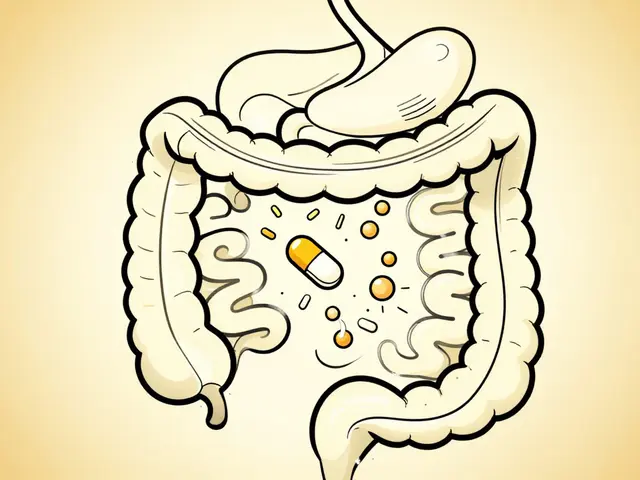Understanding Diltiazem HCL
Diltiazem HCL, or Diltiazem Hydrochloride, is a common medication used to treat high blood pressure and angina. It's a type of calcium channel blocker that works by relaxing the blood vessels so the heart doesn't have to pump as hard. This lowers blood pressure and reduces chest pain. But as with any medication, there's a potential for overdose. Understanding what Diltiazem HCL is and how it works can help us better comprehend the symptoms and treatment options for an overdose.
Recognizing the Signs of Diltiazem HCL Overdose
Recognizing the signs of a Diltiazem HCL overdose is crucial for getting immediate medical help. Symptoms can vary depending on the individual and the extent of the overdose, but generally include severe dizziness, slow heartbeat, weakness, and fainting. More severe symptoms can include heart failure, pulmonary edema, and even seizures. If you or someone else is experiencing these symptoms after taking Diltiazem HCL, it's important to seek medical attention immediately.
Understanding the Causes of Overdose
An overdose of Diltiazem HCL can occur if someone takes more than the prescribed dose, either accidentally or intentionally. This can happen if someone misreads the prescription, forgets they've already taken their dose and takes another, or intentionally takes an extra dose in an attempt to control their symptoms more effectively. It's important to always take medications as directed by your healthcare provider to prevent an overdose.
Emergency Response to Diltiazem HCL Overdose
If a Diltiazem HCL overdose is suspected, it's crucial to call for emergency medical help immediately. While waiting for help to arrive, try to keep the person calm and comfortable. Do not attempt to make the person vomit unless explicitly instructed to do so by a healthcare professional. Once medical help arrives, they will take over care and transport the person to the hospital for further treatment.
Medical Treatment Options
Once at the hospital, doctors will monitor the person's vital signs closely and administer treatments as necessary. This may include intravenous fluids, medications to counteract the effects of the overdose, and even a temporary pacemaker in severe cases. It's important to provide the healthcare team with as much information as possible about the overdose, including how much was taken and when, to help them provide the best possible care.
Long-term Consequences of Overdose
An overdose of Diltiazem HCL can have serious long-term consequences. This can include damage to the heart and other organs due to decreased blood flow during the overdose. It's important to follow up with healthcare providers after an overdose to monitor for any potential long-term effects and get appropriate treatment as needed.
Preventing Diltiazem HCL Overdose
Preventing a Diltiazem HCL overdose starts with taking the medication as directed by your healthcare provider. This includes not taking more than the prescribed dose, not taking it more often than recommended, and not sharing it with others. It's also important to store the medication in a safe place where it can't be easily accessed by others, especially children.
Understanding the Role of Mental Health in Overdose
It's important to understand that intentional overdoses often have underlying mental health issues, such as depression or anxiety. If you or someone you know is struggling with mental health issues and taking Diltiazem HCL, it's crucial to seek help from a mental health professional. They can provide support and resources to help manage these issues and reduce the risk of an overdose.
Conclusion: The Importance of Awareness and Education
Understanding the risks and signs of a Diltiazem HCL overdose is crucial for prevention and timely treatment. By being aware of the potential dangers and knowing what to do in an emergency, we can help save lives. It's also important to remember the role of mental health in potential overdoses and to seek help if needed. Education is our best weapon against the risks associated with Diltiazem HCL overdose.






Lori Johnson
I once saw a guy take 12 pills thinking they were vitamins. He was fine, but his dog ate the empty bottle and threw up for three hours. 🐶😂
Tatiana Mathis
Diltiazem is one of those medications that seems harmless until it isn't. The pharmacokinetics are complex - it's metabolized by CYP3A4, so interactions with grapefruit, macrolides, or even St. John’s wort can dramatically increase serum levels. Many patients don't realize that even a slight deviation from dosing can lead to profound bradycardia or AV block. It's not just about the dose - it's about the context. Always check for polypharmacy risks.
Michelle Lyons
They say it's an overdose but what if it's just the government testing calcium channel blockers in the water supply? I mean, why else would they make it so easy to accidentally kill yourself with a pill you're supposed to take daily?
Cornelle Camberos
The notion that an overdose could be accidental is a dangerous fallacy perpetuated by modern medical complacency. Individuals who misread prescriptions lack basic responsibility. The pharmaceutical industry has weaponized convenience. This is not a medical issue - it is a moral failure.
joe balak
I took 3x my dose once because my phone died and I forgot if I already took it. Felt like a truck ran over my chest but lived to tell it
Iván Maceda
America needs to stop handing out pills like candy. We're not Sweden. We don't need this kind of soft medicine culture. 💪🇺🇸
Vrinda Bali
In India, we call this 'pharmaceutical colonialism' - Western drugs imposed on Eastern bodies without understanding our metabolism, our diets, our ancestral wisdom. Diltiazem was never meant for our people. The side effects are not accidents - they are erasures.
John Rendek
Good info. Always keep meds in original bottles. Helps the ER team know exactly what you took.
Sonia Festa
Bro, I took my grandma’s diltiazem because I thought it was my anxiety pills. Felt like my heart was trying to exit my body through my esophagus. Now I just drink chamomile tea and stare at the ceiling. Life’s simpler that way.
Sara Allen
I think the FDA is hiding something. Why do they make these pills look like candy? And why do they put them in bottles that kids can open? Someone’s making money off this. I’m not dumb. I’ve seen the videos. The pills are laced. It’s not the drug, it’s the system.
Amina Kmiha
They say 'seek medical help' but what if the hospital is part of the conspiracy? What if they WANT you to need a pacemaker so they can bill Medicare? 💉🤯 I read on a forum that pacemakers have tracking chips. I'm not taking any IV fluids.
Ryan Tanner
You got this. If you or someone you know is struggling, reach out. You’re not alone. ❤️
Jessica Adelle
It is an affront to civilized society that such dangerous pharmaceuticals are available without mandatory psychological screening. The erosion of personal accountability is a direct result of liberal permissiveness. This is not healthcare - it is moral surrender.
Emily Barfield
Is the body not a temple? And if we are to be stewards of our own vessels, then why do we outsource our survival to chemical intermediaries? Diltiazem - a molecule born of laboratory abstraction - now dictates the rhythm of human hearts. What does this say about our relationship to nature? To self? To death? The overdose is not merely pharmacological - it is existential.
Sai Ahmed
I don’t believe in overdoses. I believe in bad prescriptions. The doctor gave me this for chest pain. I didn’t know it was for blood pressure. Now I’m dead inside. And no one cares.
Albert Schueller
I think the FDA is in cahoots with the pacemaker companies. I read this on a blog. They make more money when you need a device than when you take pills. Also, the pill bottle says 'take once daily' but the handwriting on the label looks like a robot wrote it. Something's off.
Ted Carr
Ah yes, the classic 'take as directed' mantra. As if the average person has a PhD in pharmacology. I once took my dog’s heart medication because I thought it was 'for circulation.' He’s fine. I’m not. 🤷♂️
Rebecca Parkos
I had a friend who overdosed on this and they said the ER staff were angels. Don’t wait. Don’t be ashamed. Call 911. You matter. I’m here if you need to talk.
Bradley Mulliner
The fact that this post even needs to exist is proof of societal decay. People are too lazy to read labels. Too entitled to accept consequences. This isn’t medicine - it’s a behavioral correction system for the irresponsible. And you? You’re part of the problem.